Module 2 Education Unit 2 What do I like best about school课件(60张ppt 无素材)
文档属性
| 名称 | Module 2 Education Unit 2 What do I like best about school课件(60张ppt 无素材) | 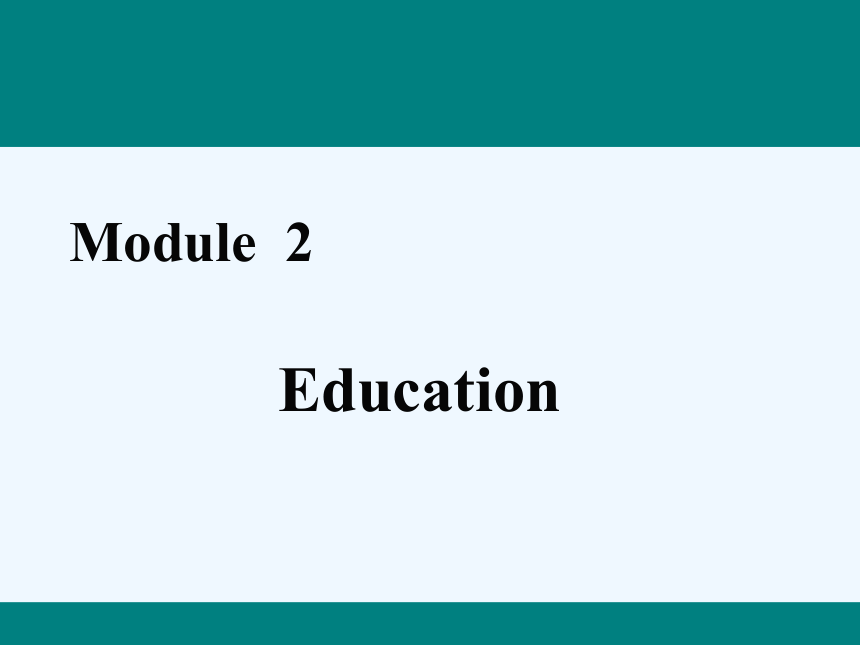 | |
| 格式 | zip | ||
| 文件大小 | 1.2MB | ||
| 资源类型 | 教案 | ||
| 版本资源 | 外研版 | ||
| 科目 | 英语 | ||
| 更新时间 | 2020-02-04 08:28:07 | ||
图片预览

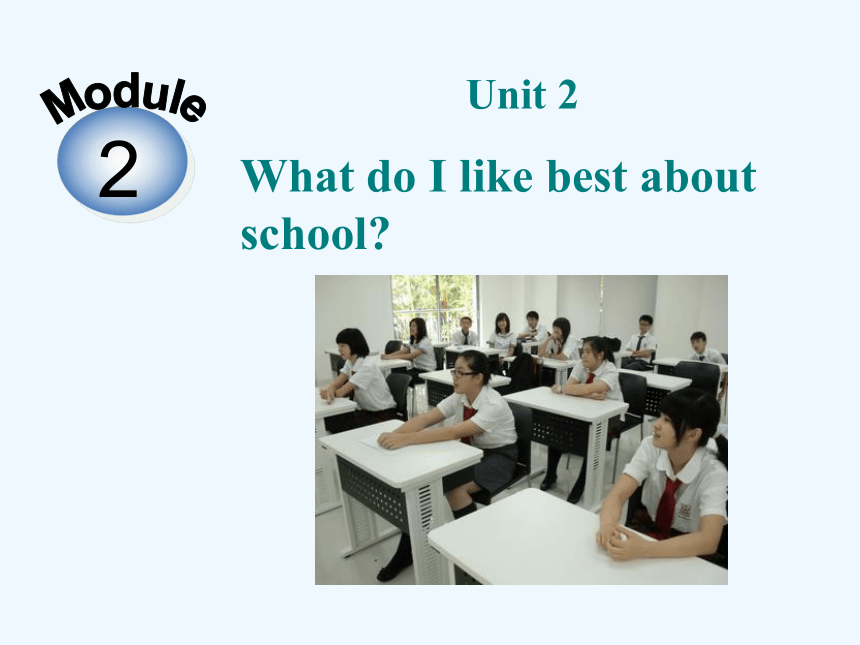
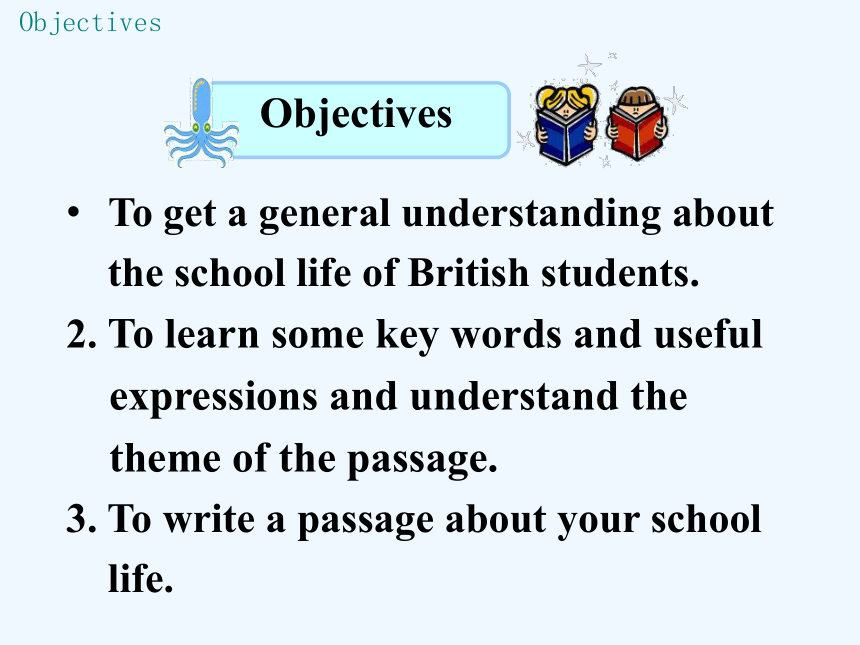

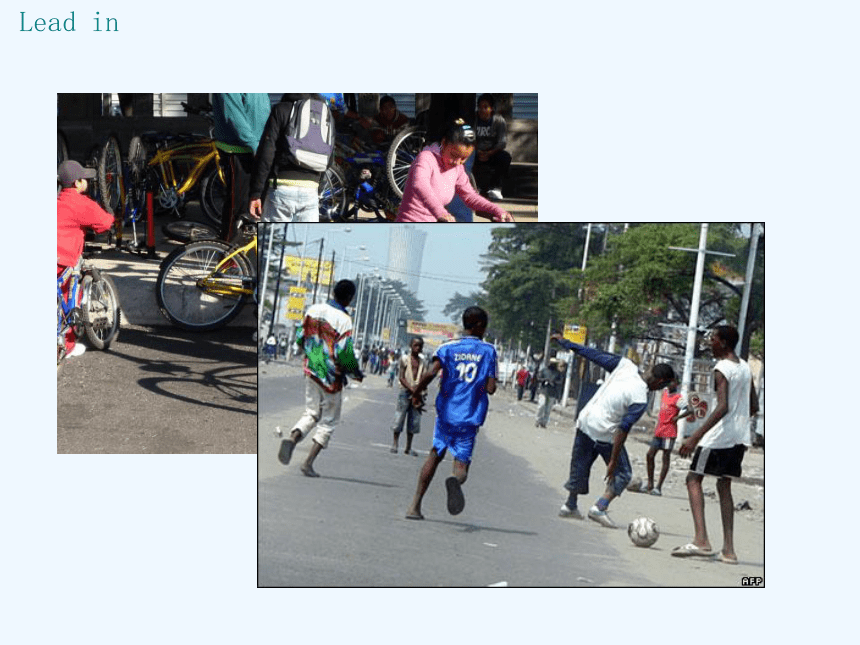
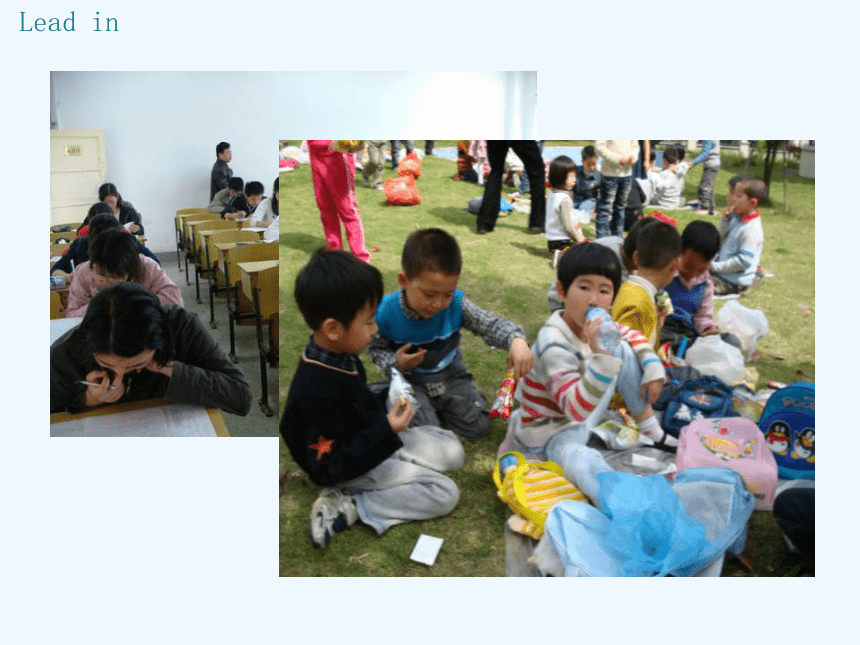
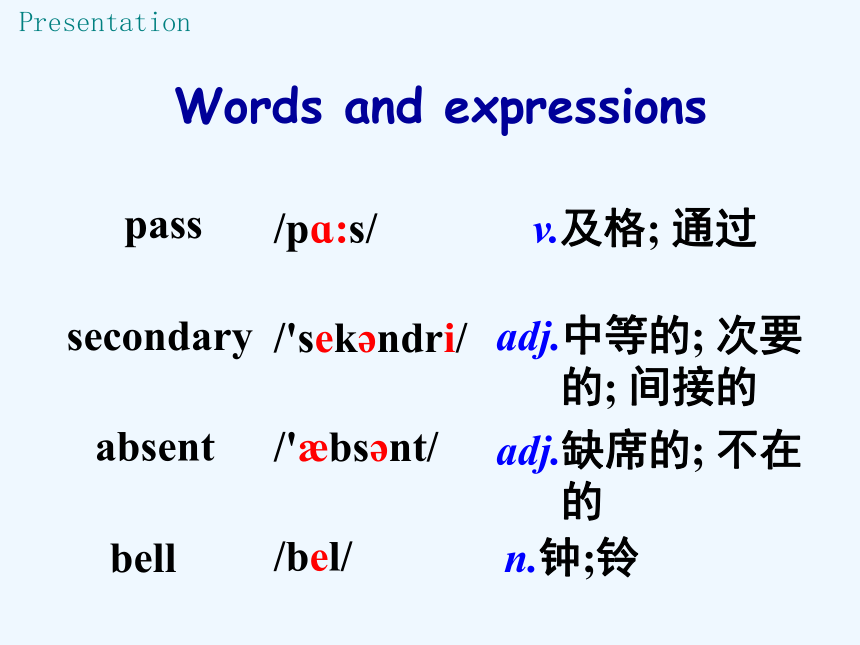
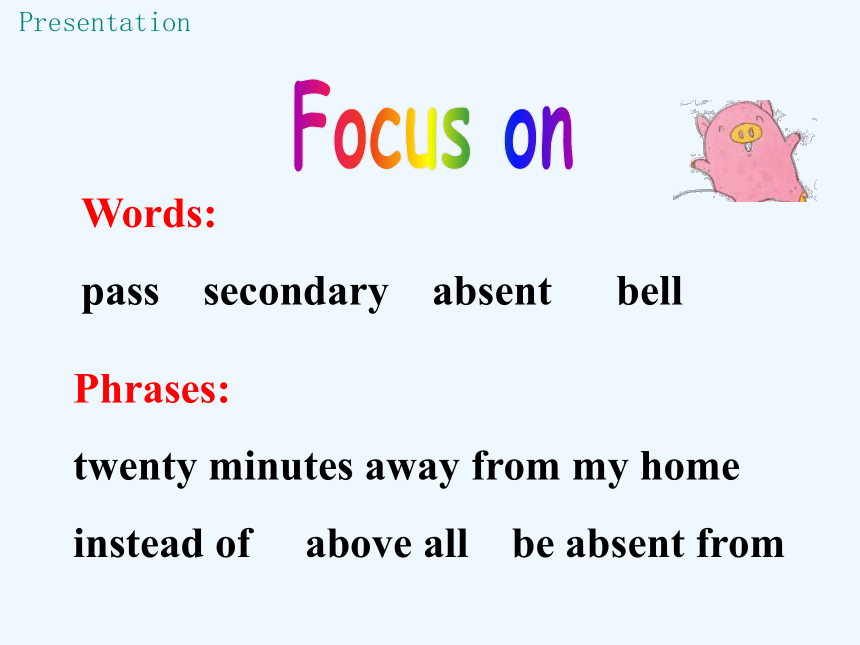
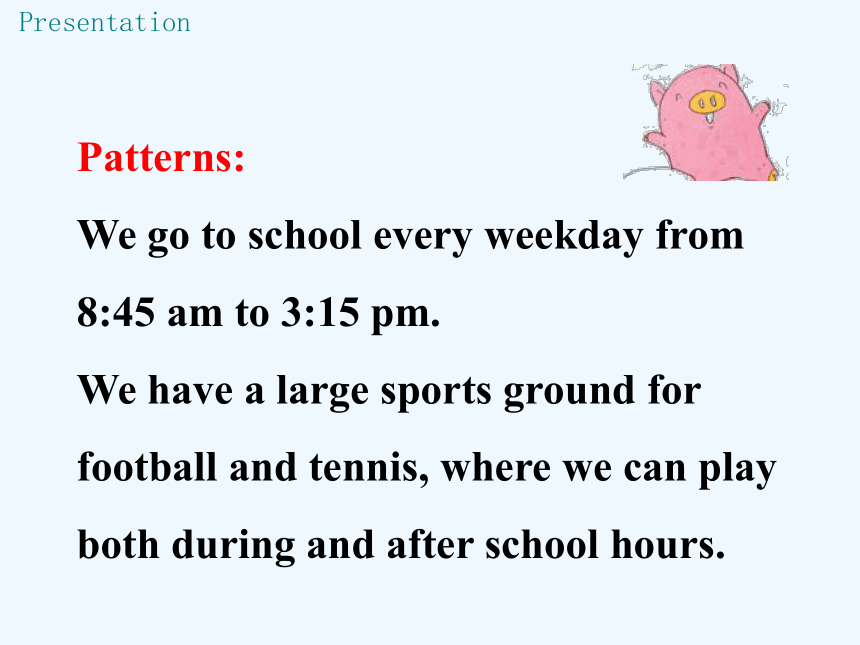
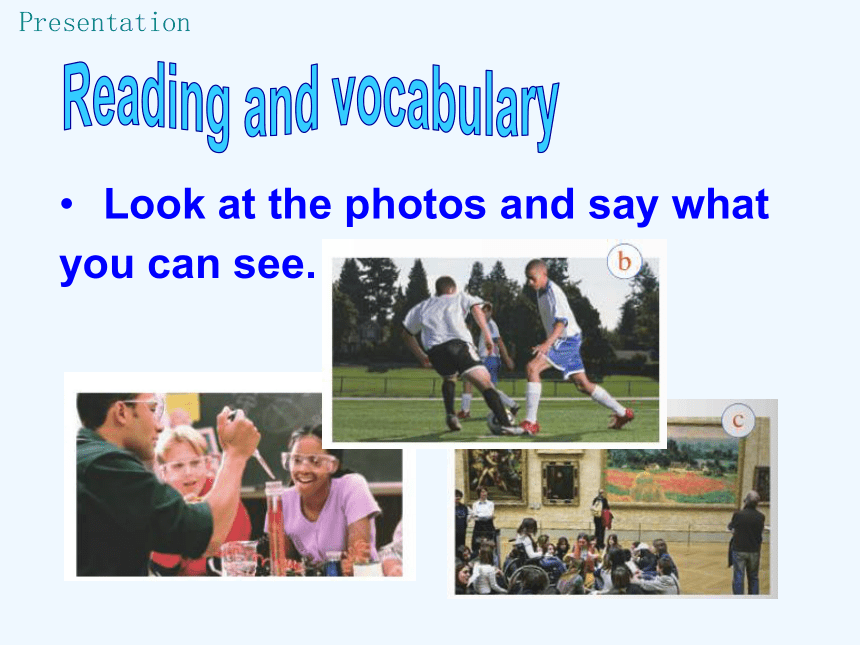
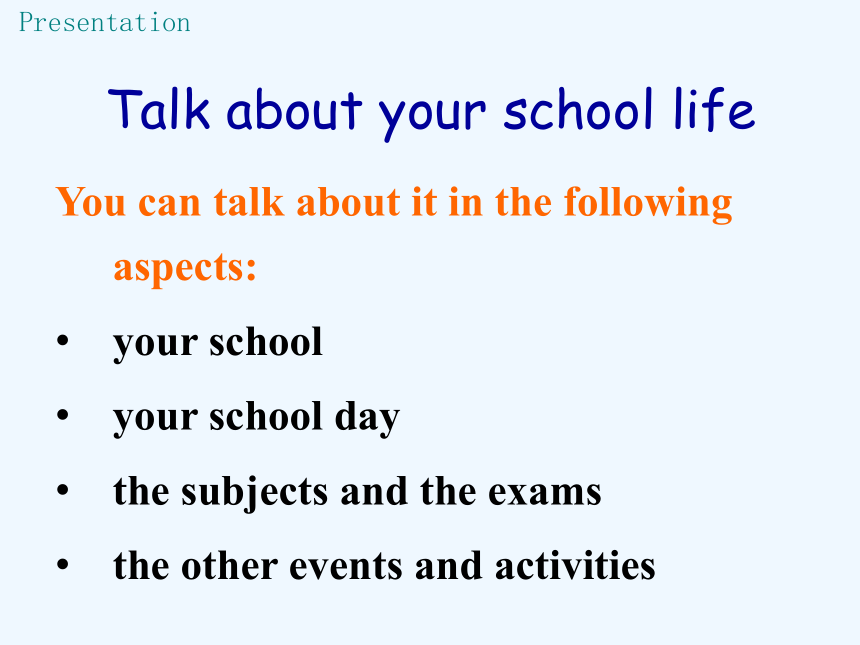

文档简介
(共60张PPT)
Education
Module 2
Unit 2
What do I like best about school?
2
To get a general understanding about
the school life of British students.
2. To learn some key words and useful
expressions and understand the
theme of the passage.
3. To write a passage about your school
life.
Objectives
Free talk
Can you talk about your school life? Do you like your school life? Why?
Lead in
Lead in
Lead in
/pɑ:s/
/'sek?ndri/
/'?bs?nt/
/bel/
v.及格; 通过
pass
adj.中等的; 次要
的; 间接的
secondary
adj.缺席的; 不在
的
bell
n.钟;铃
absent
Words and expressions
Presentation
Words:
pass secondary absent bell
Phrases:
twenty minutes away from my home
instead of above all be absent from
Presentation
Patterns:
We go to school every weekday from 8:45 am to 3:15 pm.
We have a large sports ground for football and tennis, where we can play both during and after school hours.
Presentation
Look at the photos and say what
you can see.
Presentation
Talk about your school life
You can talk about it in the following aspects:
your school
your school day
the subjects and the exams
the other events and activities
Presentation
How long has Susie been at River School?
2. How long does her schoolday last?
3. Do all the students at River School have the same subjects?
4. How do you like Susie’s school life? Why?
2. Read the passage and answer the
questions.
Presentation
My school life
My name is Susie Thompson, and I’m fifteen. I’ve been at River School, London, since I was eleven. If I pass my exams next year, I’ll stay here until I’m eighteen.
River School is a secondary school, about twenty minutes away from my
Presentation
home by bike. Before I came here, I went to the primary school near my home. I started primary school when I was five and stayed there for six years.
We go to school every weekday from 8:45 am to 3:15 pm. Before class, our teacher checks which pupils are present or absent. Then everyone goes to the
Presentation
main hall. There, our head teacher tells us news about the school. At 9:05 am the bell rings, and lessons start. Each lesson lasts for an hour. We have a break from 11:05 am until 11:15 am, then another lesson, and then lunch for an hour. In the afternoon, we have two more lessons before school finishes.
Presentation
This year I have ten subjects: maths, English, physics, chemistry, French, history, geography, music, IT and PE. Some people learn German instead of French. It’s lucky we don’t have exams in every subject.
We have a large sports ground for football and tennis, where we can play
Presentation
both during and after school hours. After-school activities, such as sports clubs and language societies, are popular too. During the school year there are usually visits to museums and to camps for activities such as climbing and walking in the country. Last year a
Presentation
group of us even went to Japan. There are parties and a sports day, and school plays are really popular. Once a term, there is a parents’ meeting, so our parents and teachers can talk about our progress.
What do I like best about school? English, chemistry, music, sports clubs, school plays… and above all, my friends!
Presentation
Tick the topics mentioned in the passage:
subject
age to go to school
after-school activity
exact location of school
time for lessons
history of the school
head teacher’s daily work
√
√
√
√
√
Presentation
1. River school is a ______ school.
A. Primary B. Secondary C. High
2. How long do they have for the lunch?
A. From 11:05 to 11:20
B. An hour.
C. Two hours
Look through the passage and choose the correct answers.
Presentation
3. What subject don’t they have?
A. PE B. IT C. Chinese
4. How often do they have a parents’ meeting?
A. Once a month.
B. Once a year.
C. Once a term.
Presentation
Now answer the questions.
How long has Susie been at River School?
She has been at River School for four years.
2. How long does her schoolday last?
Her schoolday lasts for 6.5 hours, starting
at 8:45 am and finishing at 3:15 pm.
Presentation
3. Do all the students at River School have the
same subjects?
No, not all the students at River School
study the same subjects.
4. How do you like Susie’s school life? Why?
I like Susie’s school life because she has
many after-school activities.
Presentation
3. Put the statements into the correct
group.
Susie has been at school since she was five and she will be at school until she is eighteen.
2. All schools in the UK are like River School.
3. Lessons start at 9:05 am.
4. The fourth lesson starts at 1:15 pm.
5. There is a parents’ meeting each term.
Presentation
We can get the information from the
passage directly:_____
We can get the information from the
passage indirectly: ______
We cannot get the information from the
passage: _____
3, 5
4
1, 2
Presentation
4. Complete the questions with the words in the box.
absent bell pass weekdays
1. When do you hear a _____ at school?
2. Who is ________ from school today?
3. What do you usually do on ___________?
4. How many marks do you need to ______
the English exam?
Now work in pairs. Ask and answer.
bell
absent
weekdays
pass
Presentation
Language points
如果主句为一般将来时,if 引导的条件状语从句则用一般现在时。这一规律被称为“主将从现”。
e.g. If it rains tomorrow, we won’t go
camping. 如果明天下雨, 我们就不去野营了。
1. If I pass my exams next year, I’ll stay here
until I’m eighteen. 如果明年我通过考试的话, 我会在这里学习到18岁。
Presentation
注意:延续性动词有时也用否定形式,但意义发生了变化。试比较:
I watched TV until my father came back. 父亲回来之前, 我一直在看电视。
(2) I didn’t watch TV until my father came
back. 直到父亲回来后, 我才看电视。
当until引导的从句与肯定的主句连用时, 主
句的谓语动词须是持续性动词。
Presentation
2. River School is a secondary school, about
twenty minutes away from my home by bike.
里弗学校是一所中学, 从我家骑自行车到学
校大约需要20分钟。
be away from 远离; 从……离开; 距离
e.g. I shall be away from home all this week.
这个星期我都不在家.
Presentation
Please be far away from tobaccos for you and your kin’s health!
为了自己和他人的健康,请远离香烟!
My?home?is?20?kilometers?away?from?thehospital. 我家距离医院20公里。
Presentation
3. Before class, our teacher checks which
pupils are present or absent.
上课前, 老师查看学生的出勤情况。
present作形容词时, 意思是“出席的, 在场的”, 此时它的反义词是absent ;
present 做名词时意思是“礼物”;
present 做动词时, 意为“赠送”。
present作形容词时, 还可表示“目前的, 现
在的”。
Presentation
e.g. How many people were present at the
meeting?
有多少人出席了这次会议?
This book was a present from my brother.
这本书是我哥哥给我的礼物。
He presented her with a bunch of flowers.
他送给她一束花。
I’m not at all satisfied with the present
situation.
我对目前的情况一点都不满意。
Presentation
[Practice]
用present的适当形式完成句子。
1. Everybody must be __________ at this
important meeting.
2. How many __________ have you got at the
birthday party?
3. Mr Wang ___________ each student with
a notebook.
present
presents
presents
Presentation
e.g. Some students were absent from class.
一些学生没有上课。
He absented himself from the meeting.
他开会缺席了。
absent是形容词, 意为“缺席的”。要表示“做某事缺席”, 其后常接介词from; absent也可用作及物动词, 意为“缺席”, 后常接反身代词作宾语。
Presentation
合成词absent-minded 意为“心不在焉的”。
e.g. He is always absent-minded.
他老是心不在焉。
[拓展]??
absent作形容词, 还可表示“心不在焉的”, 通常只用作定语。
e.g. He had an absent look on his face.
他脸上一副心不在焉的神情。
Presentation
4. In the afternoon, we have two more lessons
before school finishes.
下午上完两节课就放学了。
more跟数词连用修饰复数名词时, 要置于
数词之后, 即“数词 + more + 复数名词”,
可以与“another + 数词 + 复数名词”替换使用。
e.g. Would you please wait for me ten more
minutes? = Would you please wait for me
another ten minutes?
Presentation
Presentation
5. Some people learn German instead of French.
有些同学学习德语代替学习法语。
instead of 代替…,(是…)而不是…
① 作为短语介词, instead of 后面常跟名词、代
词和动名词, 偶尔也跟复合结构。
e.g. Will you go to the party instead of me?
你替我赴宴好吗?
Shall we have fish instead of meat today?
今天我们不吃肉吃鱼好吗?
Presentation
② instead of 后面还可跟形容词、副词、动词、
不定式、介词短语和从句, 这时它相当于
连词。
e.g. Taking exercise every day makes him look
younger instead of older. (连接形容词)
每天锻炼身体使他显得更年轻而不是苍老。
I go to bed late instead of early.
我总是很晚才睡。(连接副词)
Presentation
? That increased instead of decreased our
courage. 这增加而不是减少了我们的勇
气。(连接动词)
He proposes to do some work instead of to
watch television. (连接不定式)
他提议做些工作而不是看电视。
In warm weather he often reads under a
tree instead of in the library.
天气暖和的时候,他常常是在树下而不是
在图书馆里读书。(连接介词短语)
Presentation
③ instead 单独使用的时候是副词,常用于
句末。
e.g. We’ve no coffee. Would you like tea
instead?
我们没有咖啡了, 喝茶行吗?
It will take days by car, so let’s fly instead.
坐汽车得好几天时间, 所以我们还是改乘
飞机吧。
Presentation
④ 用instead的句子也可以改成instead of。
e.g. She never studies. Instead, she plays
tennis all day.
=Instead of studying, she plays tennis all
days. 她成天打网球, 而不是学习。
He didn’t give John the money, but he
gave it to me instead.
= Instead of giving John the money, he
gave it to me.
他没有给约翰钱, 而是把钱给了我。
Presentation
6. It’s lucky we don’t have exams in every
subject.
幸运的是,我们不是每一门课程都要考试。
have exams in表示“……方面的考试”, 常用介词in。
e.g. I went to take an exam in math.
我去参加数学考试了。
Presentation
7. Once a term, there is a parents’ meeting…
每学期要召开一次家长会……
once表示“一次, 一回”。
e.g. Kate says she goes shopping once a week.
凯特说她每周购物一次。
once, twice, three times, many times, ever常在现在完成时态中用作时间状态, 表示说话前发生过一次或多次的动作, 现在已成为一种经验或经历。
Presentation
When you write a composition, remember:
Write about what you know best. This usually means your family, friends, school and yourself.
Presentation
Use something you have read as a model. So My school life can be a model for your writing.
Use ideas and sentences from the model and change the details. This will help you decide what to write and how to write it.
Presentation
5. Make a timetable for your schoolday.
Presentation
6. Make a list of other events and activities during your school year.
e.g.
visits to museums, parents’ meeting, school trip to mountains …
Presentation
7. Write a passage about your school life. Use the timetable in Activity 5 and the list you made in Activity 6 to help you. Say:
when you go to school
how you get there
how long you have been at this school
what your daily timetable is
Presentation
My name is Zhang Lin and I’m a pupil at No 1 Junior High School in…
what subjects you are taking this term
what other events and activities there are
during your school year
what you like best about school
Presentation
A Sample:
My name is Zhang Lin and I’m a pupil at No.1 Junior High School in Taiyuan. I’ve been here three years ago.
Every morning I go to school at 7:30 am by bike. Before class, we have a morning talk for half an hour. Everyone can introduce something he/ she likes to
Presentation
other students, such as a poem, a short story, a popular song, a famous person. Then we have four classes
from 8:00 am. It’s time to have lunch and rest from 12:00 pm to 2:00 pm. In the afternoon, we have three classes before school finishes.
Presentation
I like the sports ground best in my school. When we finish our lessons in the afternoon, we always do some exercise there. It makes us healthier and gives us more chances to know more friends. I love my school.
Presentation
1. twenty minutes away from…
2. last for
3. have a break
4. a parents’ meeting
5. We go to school every weekday from 8:45 am to 3:15 pm.
6. We have a large sports ground for football and tennis, where we can play both during and after school hours.
本课时主要短语和句型
Summary
一、单项选择。
1. My cousin Susan can write with ____ hand.
A. every B. either C. any D. both
2. After playing football for more than a half
hour, the students took _______rest.
A. a few minute’s B. a few minutes’
C. a little minute’s D. a little minutes’
Exercise
3. Lucy knew nothing about it _______
her sister told her.
A. because B. until C. if D. since
4. Bill was listening to the radio while
Ann _______ TV.
A. watched B. was watching
C. has watched D. had watched
Exercise
二、用方框内所给单词的恰当形式填空。
pass French absent secondary parent
1. He doesn’t want to be _________ from the meeting, though he’s in poor health.
2. I have got a pen friend whose mother language is _________.
absent
French
Exercise
3. She hasn’t ________ her driving test yet.
4. Experience is what matters, age is of _________ importance.
5. At the _________ meeting, the teacher told Tom’s mother that Tom had made great progress in every subject.
passed
secondary
parents’
pass French absent secondary parent
Exercise
1) 我们的课持续一小时。
Our lessons _______________.
2) 11:05到11:20是课间休息。
We ____________ at 11:05 until 11:20.
3) 明年我要参加八门课的考试。
I _________________ in eight subjects next
year.
4) 一学期我们开一次家长会和运动会。
There is _________________ and
___________ once a term.
last for an hour
have a break
will take my exams
a parents’ meeting
a sports day
三、根据汉语提示完成句子。
Exercise
5) 咱们不喝咖啡改喝茶吧。
Let’s drink tea _______ _____ coffee.
6) 本周我们还有两节数学课。
We will have _______ _______ maths classes
this week.
7) 学习的目的不是为了参加考试。
The point of studying is not to _______
_______.
instead of
two more
take
exam
Exercise
Homework
1. Learn the new words by heart.
2. Describe your school life in your own words and then write a passage about it with more than 70 words. (The passage in this module is a model for you to use.)
Homework
Education
Module 2
Unit 2
What do I like best about school?
2
To get a general understanding about
the school life of British students.
2. To learn some key words and useful
expressions and understand the
theme of the passage.
3. To write a passage about your school
life.
Objectives
Free talk
Can you talk about your school life? Do you like your school life? Why?
Lead in
Lead in
Lead in
/pɑ:s/
/'sek?ndri/
/'?bs?nt/
/bel/
v.及格; 通过
pass
adj.中等的; 次要
的; 间接的
secondary
adj.缺席的; 不在
的
bell
n.钟;铃
absent
Words and expressions
Presentation
Words:
pass secondary absent bell
Phrases:
twenty minutes away from my home
instead of above all be absent from
Presentation
Patterns:
We go to school every weekday from 8:45 am to 3:15 pm.
We have a large sports ground for football and tennis, where we can play both during and after school hours.
Presentation
Look at the photos and say what
you can see.
Presentation
Talk about your school life
You can talk about it in the following aspects:
your school
your school day
the subjects and the exams
the other events and activities
Presentation
How long has Susie been at River School?
2. How long does her schoolday last?
3. Do all the students at River School have the same subjects?
4. How do you like Susie’s school life? Why?
2. Read the passage and answer the
questions.
Presentation
My school life
My name is Susie Thompson, and I’m fifteen. I’ve been at River School, London, since I was eleven. If I pass my exams next year, I’ll stay here until I’m eighteen.
River School is a secondary school, about twenty minutes away from my
Presentation
home by bike. Before I came here, I went to the primary school near my home. I started primary school when I was five and stayed there for six years.
We go to school every weekday from 8:45 am to 3:15 pm. Before class, our teacher checks which pupils are present or absent. Then everyone goes to the
Presentation
main hall. There, our head teacher tells us news about the school. At 9:05 am the bell rings, and lessons start. Each lesson lasts for an hour. We have a break from 11:05 am until 11:15 am, then another lesson, and then lunch for an hour. In the afternoon, we have two more lessons before school finishes.
Presentation
This year I have ten subjects: maths, English, physics, chemistry, French, history, geography, music, IT and PE. Some people learn German instead of French. It’s lucky we don’t have exams in every subject.
We have a large sports ground for football and tennis, where we can play
Presentation
both during and after school hours. After-school activities, such as sports clubs and language societies, are popular too. During the school year there are usually visits to museums and to camps for activities such as climbing and walking in the country. Last year a
Presentation
group of us even went to Japan. There are parties and a sports day, and school plays are really popular. Once a term, there is a parents’ meeting, so our parents and teachers can talk about our progress.
What do I like best about school? English, chemistry, music, sports clubs, school plays… and above all, my friends!
Presentation
Tick the topics mentioned in the passage:
subject
age to go to school
after-school activity
exact location of school
time for lessons
history of the school
head teacher’s daily work
√
√
√
√
√
Presentation
1. River school is a ______ school.
A. Primary B. Secondary C. High
2. How long do they have for the lunch?
A. From 11:05 to 11:20
B. An hour.
C. Two hours
Look through the passage and choose the correct answers.
Presentation
3. What subject don’t they have?
A. PE B. IT C. Chinese
4. How often do they have a parents’ meeting?
A. Once a month.
B. Once a year.
C. Once a term.
Presentation
Now answer the questions.
How long has Susie been at River School?
She has been at River School for four years.
2. How long does her schoolday last?
Her schoolday lasts for 6.5 hours, starting
at 8:45 am and finishing at 3:15 pm.
Presentation
3. Do all the students at River School have the
same subjects?
No, not all the students at River School
study the same subjects.
4. How do you like Susie’s school life? Why?
I like Susie’s school life because she has
many after-school activities.
Presentation
3. Put the statements into the correct
group.
Susie has been at school since she was five and she will be at school until she is eighteen.
2. All schools in the UK are like River School.
3. Lessons start at 9:05 am.
4. The fourth lesson starts at 1:15 pm.
5. There is a parents’ meeting each term.
Presentation
We can get the information from the
passage directly:_____
We can get the information from the
passage indirectly: ______
We cannot get the information from the
passage: _____
3, 5
4
1, 2
Presentation
4. Complete the questions with the words in the box.
absent bell pass weekdays
1. When do you hear a _____ at school?
2. Who is ________ from school today?
3. What do you usually do on ___________?
4. How many marks do you need to ______
the English exam?
Now work in pairs. Ask and answer.
bell
absent
weekdays
pass
Presentation
Language points
如果主句为一般将来时,if 引导的条件状语从句则用一般现在时。这一规律被称为“主将从现”。
e.g. If it rains tomorrow, we won’t go
camping. 如果明天下雨, 我们就不去野营了。
1. If I pass my exams next year, I’ll stay here
until I’m eighteen. 如果明年我通过考试的话, 我会在这里学习到18岁。
Presentation
注意:延续性动词有时也用否定形式,但意义发生了变化。试比较:
I watched TV until my father came back. 父亲回来之前, 我一直在看电视。
(2) I didn’t watch TV until my father came
back. 直到父亲回来后, 我才看电视。
当until引导的从句与肯定的主句连用时, 主
句的谓语动词须是持续性动词。
Presentation
2. River School is a secondary school, about
twenty minutes away from my home by bike.
里弗学校是一所中学, 从我家骑自行车到学
校大约需要20分钟。
be away from 远离; 从……离开; 距离
e.g. I shall be away from home all this week.
这个星期我都不在家.
Presentation
Please be far away from tobaccos for you and your kin’s health!
为了自己和他人的健康,请远离香烟!
My?home?is?20?kilometers?away?from?thehospital. 我家距离医院20公里。
Presentation
3. Before class, our teacher checks which
pupils are present or absent.
上课前, 老师查看学生的出勤情况。
present作形容词时, 意思是“出席的, 在场的”, 此时它的反义词是absent ;
present 做名词时意思是“礼物”;
present 做动词时, 意为“赠送”。
present作形容词时, 还可表示“目前的, 现
在的”。
Presentation
e.g. How many people were present at the
meeting?
有多少人出席了这次会议?
This book was a present from my brother.
这本书是我哥哥给我的礼物。
He presented her with a bunch of flowers.
他送给她一束花。
I’m not at all satisfied with the present
situation.
我对目前的情况一点都不满意。
Presentation
[Practice]
用present的适当形式完成句子。
1. Everybody must be __________ at this
important meeting.
2. How many __________ have you got at the
birthday party?
3. Mr Wang ___________ each student with
a notebook.
present
presents
presents
Presentation
e.g. Some students were absent from class.
一些学生没有上课。
He absented himself from the meeting.
他开会缺席了。
absent是形容词, 意为“缺席的”。要表示“做某事缺席”, 其后常接介词from; absent也可用作及物动词, 意为“缺席”, 后常接反身代词作宾语。
Presentation
合成词absent-minded 意为“心不在焉的”。
e.g. He is always absent-minded.
他老是心不在焉。
[拓展]??
absent作形容词, 还可表示“心不在焉的”, 通常只用作定语。
e.g. He had an absent look on his face.
他脸上一副心不在焉的神情。
Presentation
4. In the afternoon, we have two more lessons
before school finishes.
下午上完两节课就放学了。
more跟数词连用修饰复数名词时, 要置于
数词之后, 即“数词 + more + 复数名词”,
可以与“another + 数词 + 复数名词”替换使用。
e.g. Would you please wait for me ten more
minutes? = Would you please wait for me
another ten minutes?
Presentation
Presentation
5. Some people learn German instead of French.
有些同学学习德语代替学习法语。
instead of 代替…,(是…)而不是…
① 作为短语介词, instead of 后面常跟名词、代
词和动名词, 偶尔也跟复合结构。
e.g. Will you go to the party instead of me?
你替我赴宴好吗?
Shall we have fish instead of meat today?
今天我们不吃肉吃鱼好吗?
Presentation
② instead of 后面还可跟形容词、副词、动词、
不定式、介词短语和从句, 这时它相当于
连词。
e.g. Taking exercise every day makes him look
younger instead of older. (连接形容词)
每天锻炼身体使他显得更年轻而不是苍老。
I go to bed late instead of early.
我总是很晚才睡。(连接副词)
Presentation
? That increased instead of decreased our
courage. 这增加而不是减少了我们的勇
气。(连接动词)
He proposes to do some work instead of to
watch television. (连接不定式)
他提议做些工作而不是看电视。
In warm weather he often reads under a
tree instead of in the library.
天气暖和的时候,他常常是在树下而不是
在图书馆里读书。(连接介词短语)
Presentation
③ instead 单独使用的时候是副词,常用于
句末。
e.g. We’ve no coffee. Would you like tea
instead?
我们没有咖啡了, 喝茶行吗?
It will take days by car, so let’s fly instead.
坐汽车得好几天时间, 所以我们还是改乘
飞机吧。
Presentation
④ 用instead的句子也可以改成instead of。
e.g. She never studies. Instead, she plays
tennis all day.
=Instead of studying, she plays tennis all
days. 她成天打网球, 而不是学习。
He didn’t give John the money, but he
gave it to me instead.
= Instead of giving John the money, he
gave it to me.
他没有给约翰钱, 而是把钱给了我。
Presentation
6. It’s lucky we don’t have exams in every
subject.
幸运的是,我们不是每一门课程都要考试。
have exams in表示“……方面的考试”, 常用介词in。
e.g. I went to take an exam in math.
我去参加数学考试了。
Presentation
7. Once a term, there is a parents’ meeting…
每学期要召开一次家长会……
once表示“一次, 一回”。
e.g. Kate says she goes shopping once a week.
凯特说她每周购物一次。
once, twice, three times, many times, ever常在现在完成时态中用作时间状态, 表示说话前发生过一次或多次的动作, 现在已成为一种经验或经历。
Presentation
When you write a composition, remember:
Write about what you know best. This usually means your family, friends, school and yourself.
Presentation
Use something you have read as a model. So My school life can be a model for your writing.
Use ideas and sentences from the model and change the details. This will help you decide what to write and how to write it.
Presentation
5. Make a timetable for your schoolday.
Presentation
6. Make a list of other events and activities during your school year.
e.g.
visits to museums, parents’ meeting, school trip to mountains …
Presentation
7. Write a passage about your school life. Use the timetable in Activity 5 and the list you made in Activity 6 to help you. Say:
when you go to school
how you get there
how long you have been at this school
what your daily timetable is
Presentation
My name is Zhang Lin and I’m a pupil at No 1 Junior High School in…
what subjects you are taking this term
what other events and activities there are
during your school year
what you like best about school
Presentation
A Sample:
My name is Zhang Lin and I’m a pupil at No.1 Junior High School in Taiyuan. I’ve been here three years ago.
Every morning I go to school at 7:30 am by bike. Before class, we have a morning talk for half an hour. Everyone can introduce something he/ she likes to
Presentation
other students, such as a poem, a short story, a popular song, a famous person. Then we have four classes
from 8:00 am. It’s time to have lunch and rest from 12:00 pm to 2:00 pm. In the afternoon, we have three classes before school finishes.
Presentation
I like the sports ground best in my school. When we finish our lessons in the afternoon, we always do some exercise there. It makes us healthier and gives us more chances to know more friends. I love my school.
Presentation
1. twenty minutes away from…
2. last for
3. have a break
4. a parents’ meeting
5. We go to school every weekday from 8:45 am to 3:15 pm.
6. We have a large sports ground for football and tennis, where we can play both during and after school hours.
本课时主要短语和句型
Summary
一、单项选择。
1. My cousin Susan can write with ____ hand.
A. every B. either C. any D. both
2. After playing football for more than a half
hour, the students took _______rest.
A. a few minute’s B. a few minutes’
C. a little minute’s D. a little minutes’
Exercise
3. Lucy knew nothing about it _______
her sister told her.
A. because B. until C. if D. since
4. Bill was listening to the radio while
Ann _______ TV.
A. watched B. was watching
C. has watched D. had watched
Exercise
二、用方框内所给单词的恰当形式填空。
pass French absent secondary parent
1. He doesn’t want to be _________ from the meeting, though he’s in poor health.
2. I have got a pen friend whose mother language is _________.
absent
French
Exercise
3. She hasn’t ________ her driving test yet.
4. Experience is what matters, age is of _________ importance.
5. At the _________ meeting, the teacher told Tom’s mother that Tom had made great progress in every subject.
passed
secondary
parents’
pass French absent secondary parent
Exercise
1) 我们的课持续一小时。
Our lessons _______________.
2) 11:05到11:20是课间休息。
We ____________ at 11:05 until 11:20.
3) 明年我要参加八门课的考试。
I _________________ in eight subjects next
year.
4) 一学期我们开一次家长会和运动会。
There is _________________ and
___________ once a term.
last for an hour
have a break
will take my exams
a parents’ meeting
a sports day
三、根据汉语提示完成句子。
Exercise
5) 咱们不喝咖啡改喝茶吧。
Let’s drink tea _______ _____ coffee.
6) 本周我们还有两节数学课。
We will have _______ _______ maths classes
this week.
7) 学习的目的不是为了参加考试。
The point of studying is not to _______
_______.
instead of
two more
take
exam
Exercise
Homework
1. Learn the new words by heart.
2. Describe your school life in your own words and then write a passage about it with more than 70 words. (The passage in this module is a model for you to use.)
Homework
同课章节目录
- Module 1 Travel
- Unit 1 We toured the city by bus and by taxi
- Unit 2 It's a long story.
- Unit 3 Language in use
- Module 2 Education
- Unit 1 They don't sit in rows.
- Unit 2 What do I like best about school?
- Unit 3 Language in use
- Module 3 Life now and then
- Unit 1 They sometimes work harder.
- Unit 2 I think life is better today.
- Unit 3 Language in use.
- Module 4 Rules and suggestions
- Unit 1 You must be careful of falling stones.
- Unit 2 we must keep the camp clean.
- Unit 3 Language in use.
- Revison A
- Module 5 Look after yourself
- Unit 1 We'd better get you to hospital.
- Unit 2 Get off the sofa!
- Unit 3 Language in use.
- Module 6 Eating togethe
- Unit 1 When is the school-leavers' party?
- Unit 2 Knives and forks are used for most Western
- Unit 3 Language in use
- Module 7 English for you and me
- Unit 1 Have you ever been to an English corner?
- Unit 2 We all own English.
- Unit 3 Language in use
- Module 8 My future life
- Unit 1 Here's to our friendship and the future
- Unit 2 I know that you will be better at maths.
- Unit 3 Language in use
- Revison B
